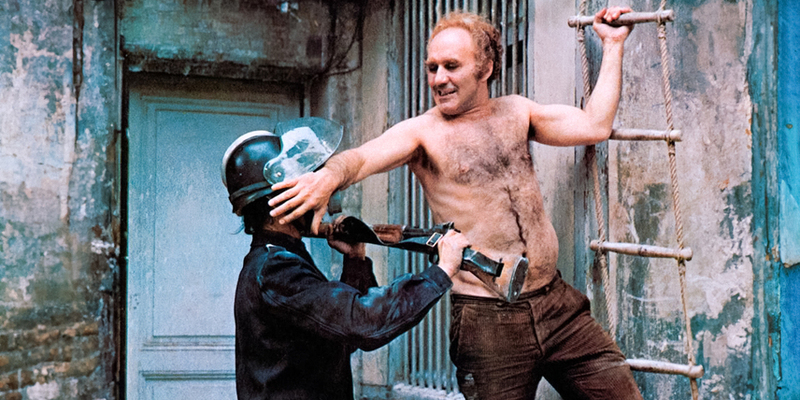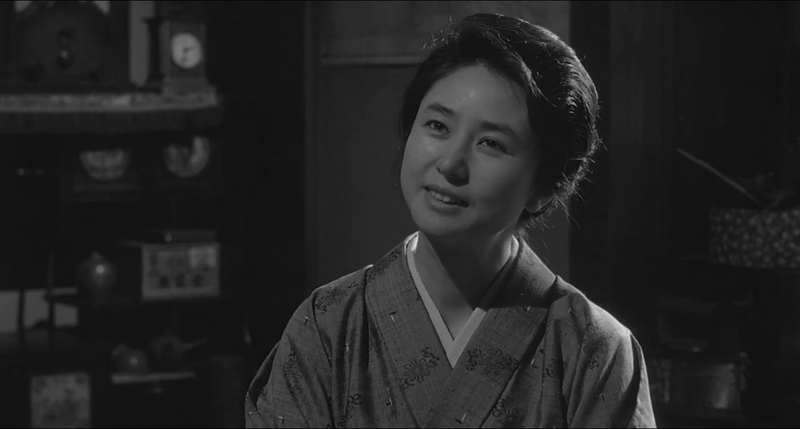
A Scream That Echoes Through the Walls
MOVIE REVIEW
Themroc
–
Genre: Satire, Comedy
Year Released: 1973, Radiance Films Blu-ray 2025
Runtime: 1h 49m
Director(s): Claude Faraldo
Writer(s): Tatsuo Nogami
Cast: Hiroki Matsukata, Tatsuo Umemiya, Tsunehiko Watase, Naoko Ohtani, Gorō Ibuki, Yōko Koizumi, Shigeru Kōyama, Kō Nishimura, Hōsei Komatsu, Tatsuo Endō, Nobuo Kaneko
Where to Watch: Available May 20, 2025. Pre-order your copy here: www.radiancefilms.co.uk, www.mvdshop.com, or www.amazon.com
RAVING REVIEW: There’s something oddly hypnotic about watching structure disintegrate on screen—not through disaster or violence as we expect, but through raw, feral rejection. THEMROC pulls off that rare feat of turning complete absurdity into a strangely coherent thesis. Claude Faraldo’s anarchist satire is messy by design, and behind every crumbling wall is a pointed critique dressed up in unfiltered chaos. It’s not content with disrupting norms; it wants to dismember them entirely and leave the remains twitching.
THEMROC starts a man trapped in routine—commute, labor, silence—until an unexpected flash of disobedience sparks a metamorphosis. Michel Piccoli embodies this eruption from monotony to primal freedom with visceral commitment, playing a man who chooses not to reform but to discard every marker of the modern world. His home becomes a cave, his speech devolves into howls, and society’s institutions buckle under the weight of his noncompliance. The simplicity of the setup allows Faraldo to sidestep convention entirely, creating an immersive breakdown where the plot is replaced with behavior, and the tone becomes the argument.
Language is the first thing to go, and that choice becomes one of the film’s most effective motivations. Replacing dialogue with growls, gibberish, and instinctual sounds, the film detaches meaning from words and locates it in motion and intention. It’s a bold move that recalls the foundations of early silent cinema while underlining the absurdity of how we package and accept communication in civilized life. By stripping this away, Faraldo dares the viewer to connect on a more guttural level—and for much of its runtime, that’s exactly what happens.
The film feels restless, with Jean-Marc Ripert’s camera never sitting still. There’s tension in the visual grammar of the piece—documentary-like movements that slowly shift into more surrealist framings. What begins as a story grounded in labor and urban grit transforms into a surrealist nightmare that mirrors the unraveling of the protagonist’s identity. Editor Noun Serra supports this transformation by piecing together a deliberately disjointed timeline, forcing us to absorb each shift in tone with as much discomfort as the characters on screen.
The performances feel untethered in a good way. Piccoli’s character leads with energy, drawing others into his chaos. The supporting cast—Miou-Miou, Béatrice Romand, Coluche, and Patrick Dewaere—function as amplifiers, gradually pulled into his circle until the apartment complex becomes a strange commune of regression. The lack of verbal interaction doesn’t diminish their impact. Each actor’s commitment turns scenes into theatrical experiments in body language, movement, and emotional contagion.
What sets the film apart isn’t its weirdness but what it becomes. Faraldo’s vision is specific, and his chaos is planned. Each moment contributes to a larger cultural exorcism. Yes, the imagery is jarring. Yes, it’s unsettling. But that discomfort is the point. It pulls us away from passive watching and into active reflection. Why does this make us uneasy? What are we clinging to?
This resistance to easy answers elevates the project. It’s not a cautionary tale or a manifesto—it’s a provocation. Rather than guiding viewers through a point-by-point takedown of society, it thrusts them into the middle of the demolition. There’s no hero, no savior—just a man tearing through his physical and metaphorical walls, dragging the neighborhood along for the ride. The film doesn't preach; it screams. And that scream captures a specific kind of unrest.
It doesn’t care to be referenced, quoted, or lionized. It asks only to be felt. THEMROC thrives in that in-between space where discomfort and clarity collide. It exists not to inform, but to infect. And that infection lingers. Long after the final frame, there’s a residual unease. Not just about what you watched, but about what you tolerate. What you accept. What you’d scream about if you finally stopped playing along.
Bonus Materials:
4K Restoration from the original negative by StudioCanal
Uncompressed mono PCM audio
Interview with critic and filmmaker David Thompson (2025)
Archival TV interview with actor Michel Piccoli and director Claude Faraldo (1973)
Interview with Manuela Lazic on Michel Piccoli (2025)
Gallery
Trailer
Optional English subtitles for the deaf and hard of hearing
Reversible sleeve featuring original and newly commissioned artwork by Sam Smith
Limited edition booklet featuring new writing by Alison Smith, author of French Cinema in the 1970s: The echoes of May
Please visit https://linktr.ee/overlyhonestr for more reviews.
You can follow me on Letterboxd, Instagram, Twitter, and YouTube. My social media accounts can also be found on most platforms by searching for 'Overly Honest Reviews'.
I’m always happy to hear from my readers; please don't hesitate to say hello or send me any questions about movies.
[photo courtesy of RADIANCE FILMS, MVD ENTERTAINMENT]
DISCLAIMER:
At Overly Honest Movie Reviews, we value honesty and transparency. Occasionally, we receive complimentary items for review, including DVDs, Blu-rays, CDs, Vinyl Records, Books, and more. We assure you that these arrangements do not influence our reviews, as we are committed to providing unbiased and sincere evaluations. We aim to help you make informed entertainment choices regardless of our relationship with distributors or producers.
Amazon Affiliate Links:
Additionally, this site contains Amazon affiliate links. If you purchase through these links, we may receive a commission. This affiliate arrangement does not affect our commitment to honest reviews and helps support our site. We appreciate your trust and support in navigating these links.



Average Rating